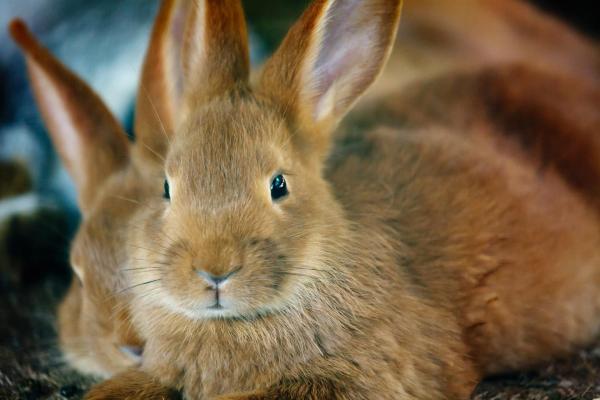My Rabbit's Pee Is Milky White



See files for Rabbits
When we keep rabbits, it is not always easy to see the state of their urine. When they are in the hutch it should be soaked into the hay that makes up their substrate. When running around the garden, it will likely seep into the grass. This can be dangerous since our rabbit's pee can tell us a lot about their state of wellbeing. Color and consistency changes to the urine of a rabbit can let us know if they are affect by certain pathological processes, especially those which affect digestion or the genitourinary systems.
At AnimalWised, we look at what happens when my rabbit's pee is milky white. We find out the difference between healthy and unhealthy rabbit urine, so you can know when to take action.
What color is rabbit pee?
To explain why a rabbit's urine might be milky white, we should take into certain characteristics about their renal system. The kidneys are partly responsible for filtering waste which is produced after eating. Rabbits need to eat a lot of hay for various reasons. As hay is high in calcium, they will ingest relatively large quantities of the mineral.
When rabbit's eat hay, it is digested in their intestines. The amount of calcium they require is absorbed by the intestines and the rest is passed on to the kidneys for processing. The kidneys will be responsible for the excretion of the urine, reabsorbing more calcium for metabolism purposes, but also getting rid of the excess. In this way, a rabbit will excrete more or less calcium depending on the ratio of amount they consume to amount they need.
Since rabbits often have a high-calcium diet, they normally consume more than they need. For this reason, it is most often normal for a rabbit's pee to be milky white. The reason for the cloudy urine is due to calcium carbonate in the urine. In fact, if a rabbit's urine is too clear, it may be a sign they are not metabolizing enough calcium in their diet. It can also occur in still-developing, pregnant or lactating rabbits.
If we see fresh blood in a rabbit's pee (hematuria), then it is understandable we will be worried. However, it is also possible the rabbit doesn't have unhealthy urine if the pee has darker or reddish tones. A rabbit's urine may be a little red due to the presence of certain pigments in their food. If we are are at all unsure, we need to speak to a veterinarian who can determine whether it is hematuria or simply coloration from their dietary intake.

My rabbit's pee is very milky white
As we have explained above, it is usually normal for a rabbit's pee to be a little cloudy. This is due to the presence of calcium carbonate in the urine derived from the calcium in their diet. Although rabbit's require plenty of calcium, is it possible the calcium levels of their urine may be too high. This is known a hypercalciuria. When this occurs, the urine may be of a slightly thicker consistency with a hue that varies between milky, creamy or even brownish.
Hypercalciuria in rabbits can cause the urine to become sludgy, leading to sludgy bladder syndrome. This is when the normal calcium crystals are retained in the bladder, causing the urine to become whiter and thicker. This can lead to the following symptoms:
- Thick creamy urine
- Dysuria (pain when peeing)
- Stains to fur around the urethra
- Pain
If the hypercalciuria is sufficiently developed, it can also lead to urolithiasis. This is the formation of bladder stones (uroliths) made up from calcium deposits in the bladder after waste is transported from the kidneys. These uroliths can be very painful for the rabbit and it is essential they receive immediate veterinary care. If not, it can cause permanent damage to the kidneys and reduce their quality of life significantly.
Urolithiasis or kidney stones in rabbits
The presence of stones in the urinary tract is known by the name of urolithiasis and can cause the rabbit to have unhealthy urine. We have seen that they are related to food, but other factors such as anatomy or the appearance of infections are also involved.
Rabbits with milky white pee are likely affected by this problem. If they are fed high-calcium foods too regularly, it can lead to calcium buildup. Obese rabbits are also more likely to develop this problem. Also, some guardians may give their rabbits mineral supplements which are giving them an overdose of calcium, especially if they eat too much calcium-rich food concurrently.
Learn more about obesity and other health issues with our article on the most common diseases in rabbits.
Symptoms of urolithiasis in rabbits
In addition to cloudy and thick urine, other symptoms of urinary tract stones in rabbits include:
- Urination problems
- Loss of appetite
- Depression
- Weight loss
- Stooped posture
- Infection
- Blood in the urine
- Dermatitis in the perineal area
If your rabbit presents any of these symptoms, it is time to go to a veterinarian who has knowledge of this species. Milder cases can be solved only with fluid therapy or massages in the bladder area. Exercise also stimulates urination. Pain relievers and antibiotics may need to be prescribed. Females are more likely to expel small kidney stones, but the male rabbit anatomy makes this more difficult. For this reason, males commonly need surgical intervention.

Proper diet for rabbits
To avoid problems associated with milky white urine in rabbits, it is important to start with a proper diet. Ensuring the rabbit has the right level of nutrition from their diet is essential in best ensuring their overall health. Since food plays a fundamental role in their health, we should ensure we make the following considerations:
- Feed: feed must always be rationed appropriately for the individual rabbit's needs. Take a look at our article on how much a rabbit should eat to learn more.
- Supplements: do not offer supplements or vitamin and mineral supplements if they have not been prescribed by the veterinarian.
- Vegetables: the consumption of hay, fresh herbs and green vegetables is basic. Alfalfa should be controlled because it contains a large amount of calcium.
- Hydration: hydration is essential and is not only enhanced by drinking. For example, we can also offer fruits or plants with a high water content.
- Calcium: the adequate concentration of calcium in the diet is around 0.5-1%. An excess of calcium that is prolonged over time also causes disorders such as heart problems and kidney failure in rabbits.
- Fiber and protein: you also have to pay attention to the intake of fiber and protein.
While unhealthy urine in rabbits can be seen in milky white pee, we also need to know that not peeing at all is a significant problem. Find out more with our article on why my rabbit won't urinate anymore.

This article is purely informative. AnimalWised does not have the authority to prescribe any veterinary treatment or create a diagnosis. We invite you to take your pet to the veterinarian if they are suffering from any condition or pain.
If you want to read similar articles to My Rabbit's Pee Is Milky White, we recommend you visit our Other health problems category.
- Bedia, M. (2017). Pathologies of the lower urinary tract of the rabbit and Pathologies of the renal system of the rabbit. Extracted from Changes in the urinary tract in the rabbit. Ateuves Magazine, 22, 18-24.
- Chapel, J. M., Benedito, J. L., Rodriguez, R., Pereira, V., & Castillo, C. (2018). Minerals in rabbit nutrition. Ateuves Magazine, 70, 12-17.
- Chapel, J. M., & Castillo, C. (2016). Metabolic Disorders of the Rabbit. Extracted from Metabolic disorders of the rabbit. Ateuves Magazine, 59, 14-16.







